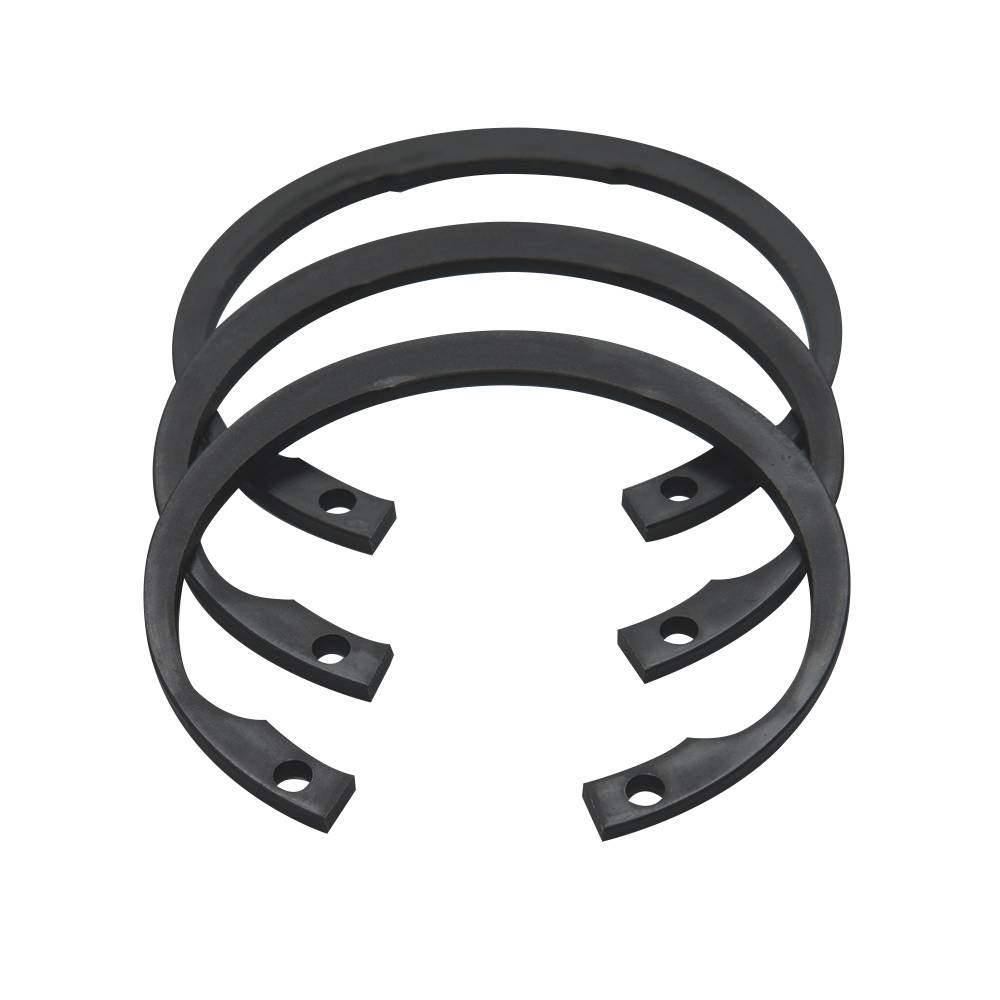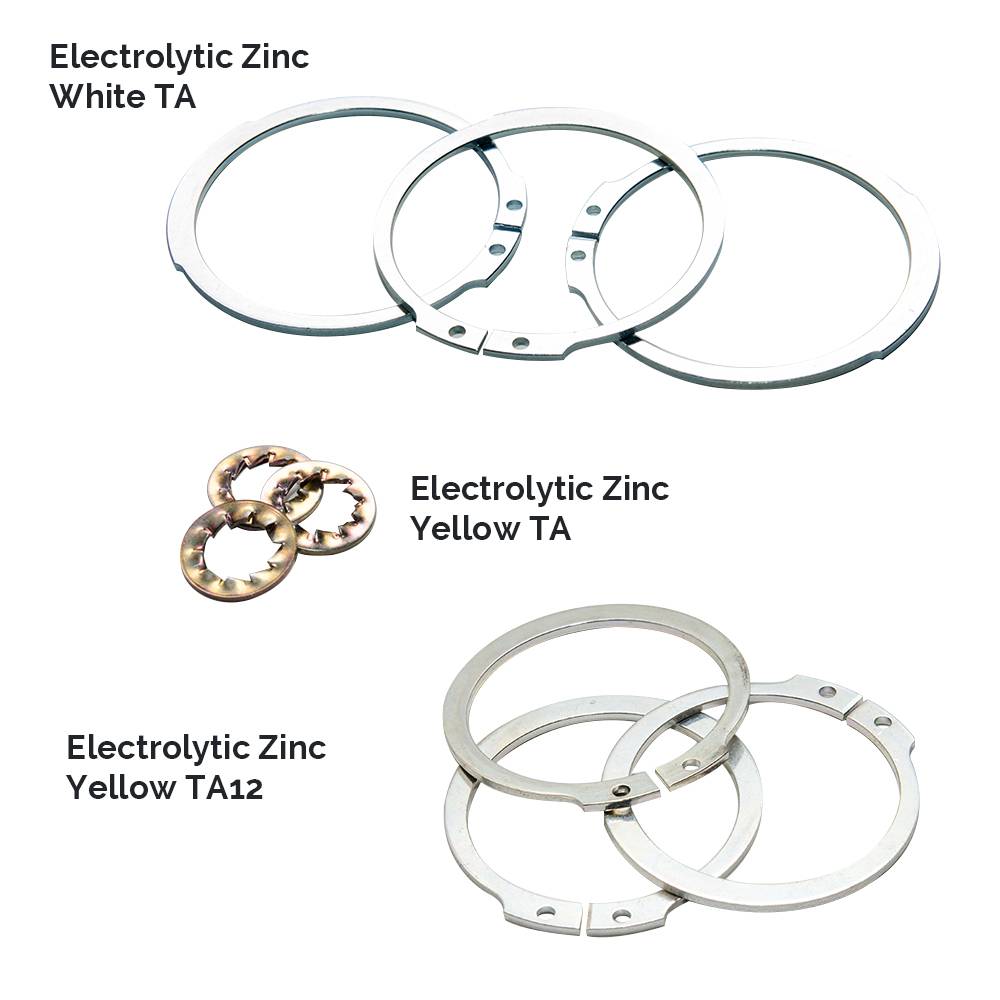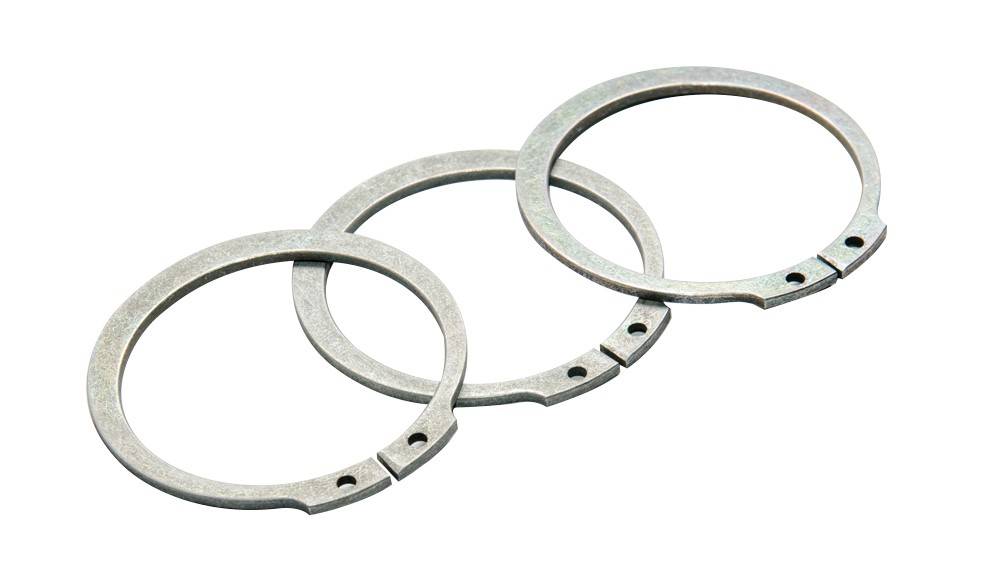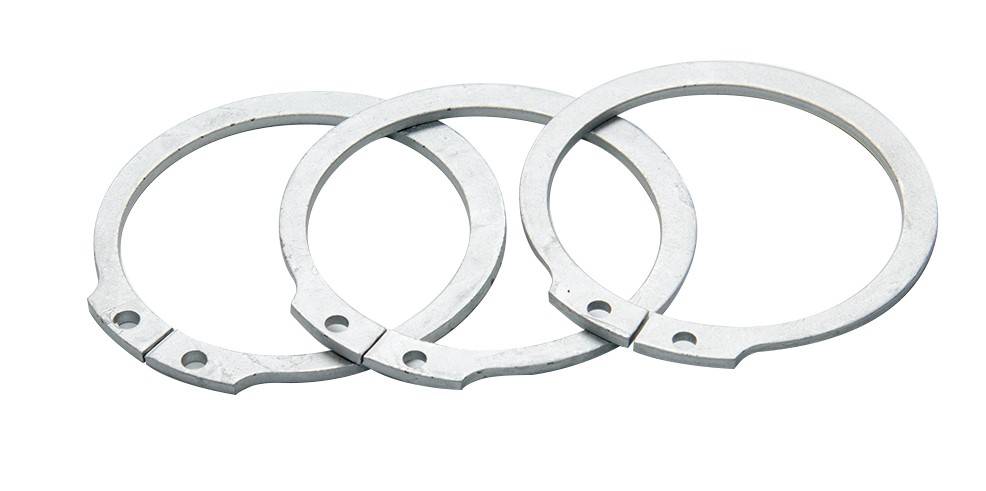

In order to prevent the natural corrosion process of carbon steel, each product is supplied with a protective coating, specifically selected basing on the type of item, the size, the production cycle and the final application. Standard finishes can provide a basic resistance to corrosion.
Better anticorrosive performances can be obtained with special surface treatments upon request, or by choosing a different type of material (eg Austenitic stainless steel Series 300).
| BENERI® FINISH | BENERI® CODE | ISO/EN DIN/UNI |
UNI ISO 9227 NSS Salt Spray Test |
COLOUR | ELV/RoHS/REACH |
|---|---|---|---|---|---|
| Self-finish and oil |
- |
- |
- |
Black/blue |
Compliant |
| Phosphate and oil |
F |
UNI/EN 12476 |
8 hours | Black/grey |
Compliant Trivalent Chrome (Cr III) |
It is the basic protection for BENERI retaining rings and washers. An oil finish is applied to self-finished parts, thus extending their commercial life.

It is BENERI standard protection for the full range of inch dimensions and for some metric sizes. This finish can guarantee a minimum corrosion resistance of 8 hours in salt spray chamber. Whether not provided as standard, Phosphating can still be quoted as special finish upon request.
Phosphating is a surface chemical conversion process, with a zinc-iron phosphate base, mainly used for protective or functional purposes on ferrous materials, such as fasteners.
The conversion process causes the dissolution of the basic material (Fe), and the formation of a phosphate layer. The status of the base metal affects the crystalline structure of the coating as well as its final appearance. This finish consists of a thick layer of crystals (5 - 11 µm, corresponding to 8 – 15 g/m2), strongly adhering to the basic material.
Phosphating is an excellent base for organic coatings (paints, plastic material) but has low protective properties, which can be strongly increased by an oil finish.
Phosphating process is followed by a 120-hours environmental dehydrogenation.

The following special finishes, quoted upon customer’s request, can provide a higher corrosion resistance.
Warning! When sizing the groove, please consider:
| BENERI® FINISH | BENERI® CODE | ISO/EN DIN/UNI |
Salt spray chamber UNI ISO 9227 NSS |
COLOUR | ELV RoHS REACH |
|---|---|---|---|---|---|
|
Phosphate with special oil |
FS |
UNI/EN 12476 |
72 ore |
Black/grey |
Compliant |
| Electrolytic Zinc |
ZA |
UNI EN ISO 4042 |
96 hours |
White |
Compliant Trivalent Chrome (Cr III) |
| Electrolytic Zinc |
TA |
UNI EN ISO 4042 |
96 hours |
Yellow |
Compliant Trivalent Chrome (Cr III) |
|
Electrolytic Zinc |
TA12 |
UNI EN ISO 4042 |
168-244 hours |
Yellow |
Compliant Trivalent Chrome (Cr III) |
| Mechanical Zinc |
ZMB |
UNI EN ISO 12683 |
96 hours |
White |
Compliant Trivalent Chrome (Cr III) |
| Zinc Flake |
KL100/KL105 |
According to main Automotive specifications |
> 480 hours |
Gray |
Compliant |
| ZINTEK 200 Prodotto Atotech® |
> 480 hours |
Gray |
Compliant |
It is a zinc-based, galvanic finish. The coating process includes a chromate treatment (Trivalent Chrome-Cr III) in order to guarantee 96 hours of corrosion resistance in salt spray chamber. Electrolytic zinc is however subject to hydrogen embrittlement, which can be partially solved by dehydrogenation.

This mechanical finish can guarantee a corrosion resistance of 96 hours in salt spray chamber.
Inside a rotating barrel and in a controlled chemical environment, the zinc powder is compressed by means of impact (glass marbles) over properly prepared metallic sub-layers.
This type of plating is not subject to hydrogen embrittlement (a residual embrittlement may result from cleaning, though it usually dissolves at room temperature within 24h).

It is an inorganic coating based on zinc flakes, aluminum and organic binders with excellent anticorrosive properties.
The “dip-spin” application is done by immersion, centrifugation and polymerization. The excellent resistance to corrosion is obtained through the zinc cathodic protection, the barrier effect produced by zinc and aluminum flakes and the reaction of the binders with the base metal.
This type of coating is not subject to hydrogen embrittlement,however parts may show possible contact marks on their surface. Furthermore, small / medium-sized pieces may stick together during zinc flake process (therefore this finishing is not performed on very small parts).
